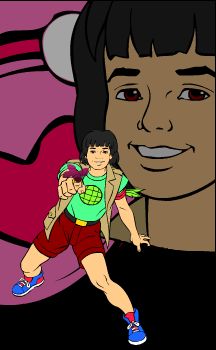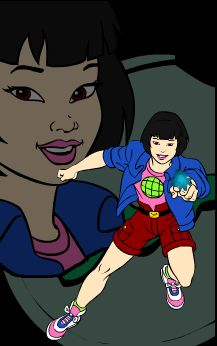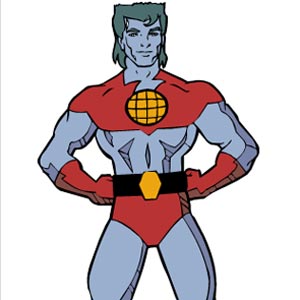
In honor of yesterday being the first day of summer, I thought I'd kick of this sweltering season with a refreshing burst of non sequitor boy band absurdity. The 90s were a heyday for boy bands and girl groups; teenyboppers fell over themselves and swarmed the TRL studios in droves to catch a glimpse of these highly calculated, well-managed, overly-primped and coiffed ensemble acts. One of the greatest mysteries of the 90s is how a decade that began as so musically rebellious so quickly morphed into a veritable bubblegum pop teenage circus*.
Not all boy bands were assembled by sleazy record producers at open casting calls seeking "The Bad Boy" and "The Sensitive One." Sometimes, for reasons probably better left unexplained, these types of musical groups saw fit to form organically. LFO (short for Lyte Funky Ones, if that's any clue to the secret of their long lost street credibility) was one of these bands. The group formed in 1995, which meant they spent a good 4 years failing to crack the ever-enigmatic fortress of formulaic pop music. It's hard to say which is worse: that they never had a doubt about the self-perceived brilliance of their musical output, or that they suffered tumultuous periods of uncertainty but managed to persevere for the sake of the greater good.
After their years of wandering parched in the proverbial music desert, music markets inexplicably decided to offer these boy bandits (boy banders?) a nice cool drink. Sure, they had encountered marginal success on the UK Billboard charts, but they could at best be classified in the late stages of obscurity. By the late 90s, they had finally managed to garner some attention with the accidental leak of their inane demo song, "Summer Girls."

Summer Girls is clearly a very polarizing song. If you zip on over to Amazon.com, you'll see most reviewers give the single either one or five (out of five) stars. These dispensers of judgment speak passionately on both sides of the energy-and-time-wasting debate. One five star reviewer enthusiastically writes, "THE BEST SONG FOR A&F LOVERS!!!!!!!" The liberal use of both all-caps and generous exclamatory punctuation certainly expresses their support for both LFO's single and the bitchin' Abercrombie-wearing lifestyle. Well played, reviewer.
On the other side of the Summer Girls battle, a verbose and angry anti-LFOer contends, "I mean, it would be one thing for this song to simply exist in it's own suicidal dimension, not dragging anyone to the hungry abyss with it; but it insists on pressing itself upon our nation, seizing the nubile minds of our youth in its evil maw and condemning them to a lukewarm existence with candy-coated ideas of life." (And I thought I wrote tirelessly long sentences. That one boasts an incredible 59 words. That's a fourth of an eighth grade book report, right there. Congratulations, Captain Spare Time, for this landmark achievement in wordiness.)
So perhaps that dark, angry reviewer took it a tiny bit too far in demonizing the song's "evil maw" and its captivating trance over the young and impressionable, but the sentiment is clear. A lot of people really, really, did not like this song. It represented all that was empty and vapid about teenage pop music in the late 90s. On the other hand, in some sort of colossal teenybopper inside joke, a serious contingency of people swore this song was brilliant. The jury's still out on this one, so I'll leave it to you to be presiding judge:
It goes a little something like this:
Yeah, I like it when the girls stop by
In the summer
Do you remember?
Do you remember
When we met that summer...
What can I say, I like the way this is going already. rhyming words with themselves is an art form, I tell you. An art form!
New Kids on the Block had a bunch of hits
Chinese food makes me sick
And I think its fly when girls stop by for the
Summer, for the summer
I like girls that wear Abercrombie and Fitch
Id take her if I had one wish
But shes been gone since that summer,
Since that summer
In case you have yet to notice, the song uses completely unrelated examples and reads like a poorly-written advertisement for Abercrombie and Fitch. We get it, you like the store's women's clothing selection and its consumer base. Was this love really worth penning a song over?
Hip-hop mama laid spic and span
Met you one summer and it all began
You're the best girl that I ever did see
The great Larry Bird, jersey 33
When you take a sip, you buzz like a hornet
Billy Shakespeare wrote a whole bunch of sonnets
Call me willy whistle cause I cant speak baby
Somethin' in your eyes went and drove me crazy
When we get past the chorus, we get to see just how nonsensical the song really is. I don't know about you, but I'm fairly certain that "hornet" and sonnet" do not rhyme. A travesty, indeed. If you're going to use completely non-related lines, why not at least make them rhyme properly. Is that so much to ask?
Now I cant forget you and it makes me mad
Left one day and never came back
Stayed all summer then went back home
Macaulay Culkin was in Home Alone
Fell deep in love, but now we ain't speakin'
Michael J. Fox was Alex P. Keaton
When I met you I said my name was Rich
You look like a girl from Abercrombie and Fitch
Alright, I like the way this is going. Hello, 80s and 90s randomly inserted pop culture references! It is nice the way this Rich fellow occasionally intersperses it with something marginally relevant to the song.
New kids on the block had a bunch of hits
Chinese food makes me sick
And I think its fly when girls stop by for the
Summer, for the summer
I like girls that wear Abercrombie and Fitch
I'd take her if I had one wish
But she's been gone since that summer,
Since that summer
The chorus obviously needs no further editorialization. I'm pretty sure it speaks for itself.
Cherry Pez, Coke, Crush Rock, Stud Boogie
Used to hate school, so I had to play hooky
Always been hip to the b-boy style
Known to act wild and make a girl smile
Love New Edition and the candy girl
Remind me of you because you rock my world
You come from Georgia where the peaches grow
They drink lemonade and speak real slow
You love hip-hop and rock & roll
Dad took off when you were 4 years old
There was a good man named Paul Revere
I feel much better baby when youre near
You love fun dip and Cherry Coke
I like the way you laugh when
I tell a joke when I met
You I said my name was Rich
You look like a girl from Abercrombie and Fitch
At least in this one we get a brief history lesson. If ever asked who went from town to town on horseback announcing that the English were coming, you can just hum through Summer Girls to recall the answer. This Rich also really, really likes Cherry flavoring. Cherry Pez and Cherry Coke? Surely you jest, Rich. How could one handle such intense sugary fruitiness?
Chorus (let's skip this one, for all of our sanity)
In the summertime girls got it goin on
Shake and wiggle to a hip-hop song
Summertime girls are the kind I like
Ill steal your honey like I stole your bike
Boogaloo shrimp and pogo sticks
My mind takes me back there oh so quick
Let you off the hook like my man Mr. Limpet
Think about that summer and I bug cause I miss it
Like the color purple, macaroni and cheese
Ruby red slippers and a bunch of trees
Call you up, but whats the use
I like Kevin Bacon, but I hate Footloose
You came in the door I said it before
I think Im over you, but Im really not sure
When I met you I said my name was Rich
You look like a girl from Abercrombie and Fitch
I was about to write this one off completely until they made that Mr. Limpet reference. Sold!
Also, I may have to disagree with you on Footloose, Rich. Respectfully, of course.
Okay, so perhaps that's all we can take of that, but you must admit there's a certain...charm to their inanity. Sure, it's a gimmick, but sometimes gimmicks sell. Indeed, this was not the last we saw of LFO. They also brought us the equally intelligent "Girl on TV":
And yes, the Girl on TV in the video is Jennifer Love Hewitt. This song was somewhat less tangential, but it was still definitely pushing our boundaries of lyrical tolerance. I'll admit, in a moment of middle school weakness, I did possibly have a soft sport for this song. A small one, though. Cross my heart. Tiny.
Regardless of their apparently controversial music (on Amazon, that is), they had more staying power than you may have assumed. After all, whenever Summer Girls comes up on shuffle on my iPod in the car, all the passengers miraculously seem to know all the words.
Don't judge.
*And yes, I recognize that there was plenty of high quality alternative music that was popular in the late 90s. We're talking a shift in th etrends of mainstream youth culture, and is thus not meant to be a judgment of quality in any way. (obviously)














